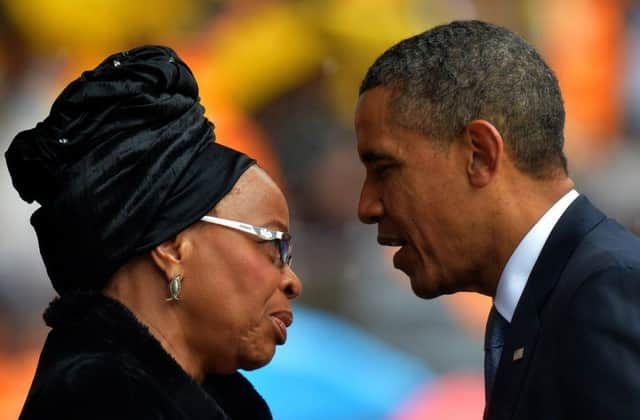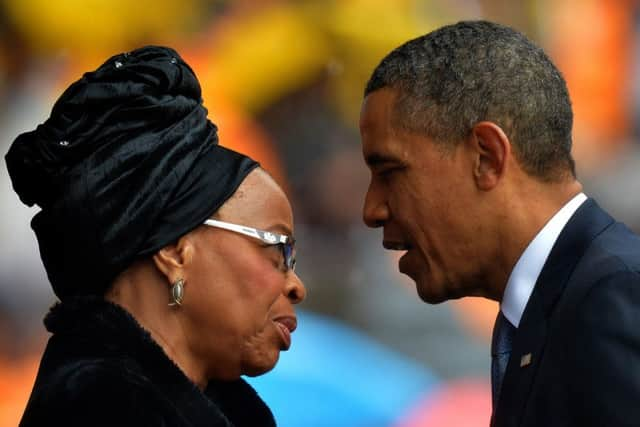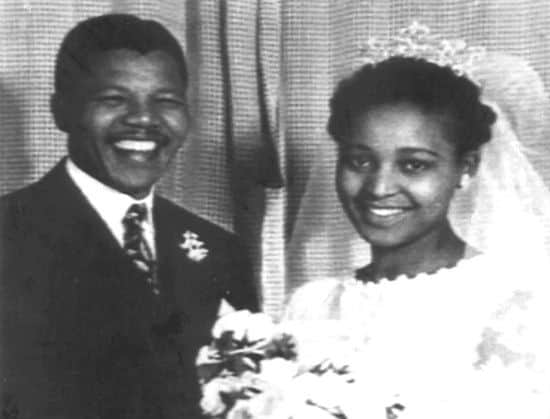Obama: ‘Mandela makes me want to be a better man’


Eulogised by US president Barack Obama as a “giant of history” and the last great liberator of the 20th century, Mr Mandela was remembered in a four-hour ceremony in Johannesburg which was broadcast live around the world.
In a nation where rain is a welcome promise rather than a gloomy threat, the dark clouds were treated as an auspicious sign.
Advertisement
Hide AdAdvertisement
Hide AdAs South Africa’s defence minister Nosiviwe Mapis-Nqakula said: “It’s a blessing from the ancestors welcoming a son of the soil.”


The welcome at the FNB stadium accorded to the memory of the man they called Madiba, after his tribal name, was no less thunderous, as people danced, sang and blew vuvuzelas, watched by one of the largest gatherings of heads and former heads of state in recent years.
In life, Mr Mandela brought together blacks and whites into a Rainbow Nation. In death, he reconciled, if only for a second or two, the United States and Cuba, as Mr Obama shook hands with the island’s leader, Raul Castro, as the US president made his way to the podium to deliver what many regarded as his finest speech since taking office.
TO the loudest cheers of the day, Mr Obama said Mr Mandela had taught the world the power of action and ideas, and that it had taken a man like him to free not only the prisoner, but the jailer.
He said: “We will never see the likes of Nelson Mandela again. While I always fall short of Madiba, he makes me want to be a better man.”


The US president spoke of the “heroic” life of the South African anti-apartheid hero, describing him as the “last great liberator of the 20th century” as he addressed thousands gathered in the stadium in Soweto.
Mr Obama compared Mr Mandela’s actions to those of Gandhi, Abraham Lincoln and US civil rights leader Martin Luther King, but also warned against viewing Mr Mandela as detached from normal life.
He said: “He was not a bust made of marble, he was a man made of flesh and blood.”
Advertisement
Hide AdAdvertisement
Hide AdMr Obama further singled out world leaders who have publicly welcomed gains made by Mr Mandela, but resisted reforms to tackle inequality and injustice in their own countries.
“Around the world today, we still see children suffering from hunger and disease and we still see rundown schools and we see young people without prospects for the future,” he said.
“Around the world today, men and women are still imprisoned for their political beliefs and are still persecuted for what they look like and how they worship and who they are; that is happening today.
“There are too many people who happily embrace Madiba’s legacy of racial reconciliation but passionately resist even modest reforms that would challenge chronic poverty and growing inequality.
“There are too many leaders who claim solidarity with Madiba’s struggle for freedom, but do not tolerate dissent from their own people. There are too many of us on the sidelines comfortable in complacency or cynicism.”
Mr Obama warned against viewing Mr Mandela as “detached” from normal life.
HE said: “It was precisely because he could admit to imperfection, because he was so full of good humour, even mischief despite the heavy burdens that he carried, that we loved him so.
“He was not a bust made of marble, he was a man of flesh and blood, a son and a husband, a father and a friend. That is why we have learned so much from him and that is why we can learn from him still.
Advertisement
Hide AdAdvertisement
Hide Ad“Nothing he achieved was inevitable. In the arc of his life, we see a man who earned his place in history through struggle and shrewdness and persistence and faith.”
When Cuban president Raul Castro addressed the crowd, he reminded them of how his older brother, Fidel, had been a harsh critic of apartheid and supporter of the ANC when other nations turned their back. He said that Mr Mandela was “the ultimate symbol of dignity and the revolutionary struggle.”
The secretary-general of the United Nations, Ban Ki-moon, said that South Africa had lost a hero. He said: “It has lost a father… He was one of our greatest teachers.
“He taught by example. He sacrificed so much and was willing to give up all he had for freedom and democracy.”
The first speaker at the memorial service, which was held five days ahead of Mr Mandela’s funeral this Sunday, was Andrew Mlangeni, a close friend and a fellow inmate of the former South African president on Robben Island, the prison when Mr Mandela spend more than 20 years of his 27-year imprisonment.
He told the crowd that Mr Mandela had “created hope when there was none”.
THE cheers were replaced by a number of boos when Jacob Zuma, the current president of South Africa, came to speak, despite the best efforts of a “praise poet”, whose job it is to whip up the crowd before each of the controversial president’s speeches. Mr Zuma repeatedly said that Mr Mandela was “one of a kind” and described him as “a fearless freedom fighter who refused to allow the brutality of the apartheid state to stand in the way of the struggle for the liberation of his people”.
Among those attending yesterday’s service were Prime Minister David Cameron and his three predecessors, Sir John Major, Tony Blair and Gordon Brown.
Advertisement
Hide AdAdvertisement
Hide AdAlso seen arriving at the service were supermodel Naomi Campbell, rock star Bono, former South African president FW de Klerk, former US president Bill Clinton and his wife, former US secretary of state Hillary Clinton, former French president Nicolas Sarkozy and the current French president, François Hollande.
When Graca Machel, Mr Mandela’s third wife and widow, arrived at the stadium, she was greeted with huge cheers, as was his former wife, Winnie Madikizela-Mandela, when both women embraced.
The heavy rain did take its toll, with the stadium only half full when the service began and, although it filled up over the next four hours, empty gaps were always visible, meaning it never reached its capacity of 95,000.
YET across the nation, and the world, millions more watched the service as it was broadcast live.
Speaking after the event, Mr Blair said the service was “extraordinary”.
Asked for his memories of Mr Mandela, he said: “He was so good with everyone, so easy with everyone.
“He was very determined, not to turn into, as Barack Obama said earlier, a sort of ‘marble bust’, a sort of remote figure.
“He was very human and great fun.
“He was always reaching out to people, always trying to reconcile them and bringing people together and he did it in a way where there was something quite transcendent about it.
Advertisement
Hide AdAdvertisement
Hide Ad“It was uncanny, his ability to reach people, not just on an emotional but almost on a spiritual level.”
Mr Mandela, who died last Thursday aged 95, made his last public appearance at the stadium at the closing ceremony of the 2010 football World Cup.
Among the tens of thousands of ordinary citizens at the stadium yesterday was Shahida Rowe, from Johannesburg, who said: “The core of Madiba’s life was humanity. That is why I am here today and why the world is celebrating.
“Thanks to him, I was recognised as a human being.”
SEE ALSO
• Subscribe to The Scotsman Apple and Android tablet apps
Our apps offer the latest news throughout the day as well as complete electronic copies of the newspaper.
The apps - which are available on Amazon Appstore, Apple iTunes and Google Play , have been designed to offer readers a dynamic way to keep up to date whether at home or on the move.
They feature full articles, videos and picture galleries plus the ability to browse through complete downloadable editions of the paper which can also be read offline later.
Print subscribers of The Scotsman are entitled to any version of the app to suit their device as part of their subscription.
Alternatively readers can subscribe to the app through the app stores, and will get 30 days free access.